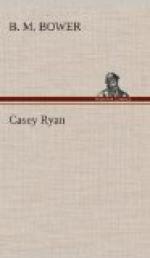There was cold coffee in a nickel percolater, and Casey poured himself a cup, knowing well the risk of eating much just at first. It was while he was unscrewing the top of the glass jar that held the sugar that he first noticed the paper. It was folded and thrust into the sugar jar, and Casey pulled it out and held it crumpled in his hand while he sweetened and drank the coffee, forcing himself to take it slowly. When the cup was empty to the last drop he went over and sat down on the edge of a spring cot and unfolded the note. What he read surprised him a great deal and puzzled him more. I leave it to you to judge why.
“I saw it again last night in a
different place. The last horse died
yesterday down the canyon. You can
have the outfit. I’m going to beat
it out of here while the going’s
good. Fred.”
“That’s mighty damn funny,” Casey muttered thickly. “You can—ask—” He lay back luxuriously, with his head on the white pillow and closed his eyes. The reaction from struggling to live had set in with the assurance of his safety. He slept heavily, refreshingly.
He awoke to the craving for food, and immediately started a small fire outside and boiled coffee in a nice new aluminum pail that held two quarts and had an ornamental cover. The oil stove he dismissed from his mind with a snort of contempt. And because nearly everything he saw was catalogued in his mind as a luxury, he opened cans somewhat extravagantly and dined off strange, delectable foods to which his palate was unaccustomed. He still thought it was mighty queer, but that did not impair his appetite.
Afterwards he went out to look after William, remembering that horses were said to have died in this place. William was almost within kicking distance of the spring, as if he meant to keep an eye upon the water supply even though that involved browsing off brush instead of wandering down to good grass below the camp.
Casey knelt stiffly and drank from the spring, laving his face and head afterward as if he never would get enough of the luxury of being wet and cool. He rose and stood looking at William for a few minutes, then took the lead rope and tied him to a juniper that stood near the spring. The note had said that the last horse died down the canyon, the implication of mystery lying heavy behind the words.
Casey went back to the tent and read the note through again twice, studying each word as if he hoped to twist some added information out of it. It sounded as though the writer had expected his partner back from some trip and had left the note for him, since he had not considered it necessary to explain what it was that he had seen again in a different place. Casey wondered if it might not have been that strange light which he himself had followed. Whatever it was, the fellow had not liked it. His going had all the earmarks of flight.
Well, then, why had the last horse died down the canyon? Casey decided that he would go and see, though he was not hankering for exercise that day. He took a long drink of water, somewhat shamefacedly filled a new canteen that lay on a pile of odds and ends near the tent door, and started down the canyon. It couldn’t be far, but he might want a drink before he got back, and Casey had had enough of thirst.




